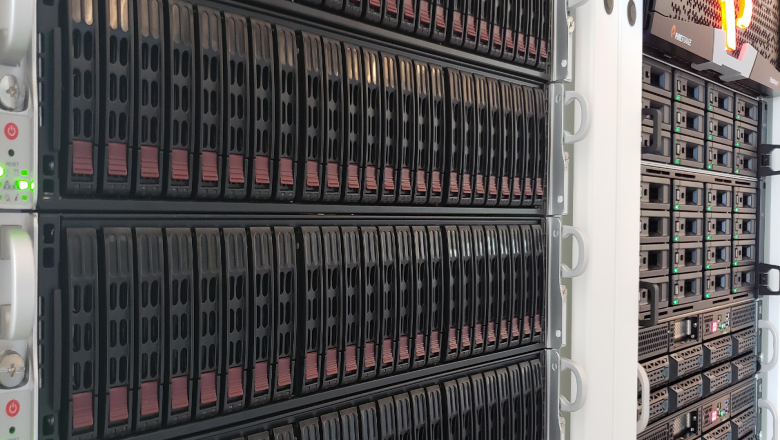- Campus Services
- Budget Office
- Campus Controller
- Campus Planning and Design
- Career and Professional Development
- Event Operations
- Facilities Management
- Fire & Life Safety
- Institutional Compliance and Internal Audit
- Institutional Research and Decision Support
- Legal Affairs
- Mail Services
- Marketing and Public Affairs
- Parking Services
- Public Safety
- Sustainability
- Copy Jobs
- Campus Resources
- Marketing and Public Affairs
»Research Hosts & Clusters
Keck Computational Research Cluster
The Keck Computational Research Cluster is the premier computational resource available to Chapman researchers. Located in the Keck Center for Science and Engineering and extending into multiple public clouds, it provides CPU and GPU processing for research workloads of all kinds.
Cluster Summary (for grant applications):
The Keck College High Performance Computing (HPC) cluster is available for researchers to run computationally-demanding, large-memory-requirement research workloads quickly and efficiently. Located in Chapman University's Keck Center for Science & Engineering, the cluster contains over 2560 Intel Xeon and AMD EPYC compute cores, 12.8 TB of RAM, and direct access to all-flash and disk-storage SAN arrays. 24 Nvidia TESLA GPU modules (A100/V100) are available for workloads that benefit from GPU-accelerated processing. Access and management of the cluster and associated applications is supported by the University's IS&T Research Computing team.
Cluster Overview
-
15 physical on-premise servers
-
2560 Intel Xeon CPU and AMD Epyc CPU cores
-
12.8 TB of RAM
-
40,960 NVIDIA Turing GPU CUDA cores
-
5,120 NVIDIA Turing GPU Tensor cores
Detailed server breakdown:
-
One Deep-Learning Supermicro/Exxact Intel node
-
384 GB RAM
-
48 Intel Xeon cores
-
8 NVIDIA Tesla V100 SXM2 GPUs
-
- Two Deep-Learning Asus Intel nodes
- 384 GB of RAM each
- 40 Intel Xeon cores each
- 5 NVIDIA Tesla V100 GPUs
-
Two Machine-Learning Supermicro AMD nodes
- 512 GB of RAM each
-
3 NVIDIA Tesla V100 GPUs
-
Seven General-Purpose Supermicro Intel nodes
-
256Gb of RAM each
-
72 Intel Xeon cores each
-
- Three General-Purpose Supermicro AMD nodes
- 2048 GB of RAM each
- 256 AMD EPYC cores each
-
One Supermicro / Bright Computing Intel Head-node
-
16 Intel Xeon cores
-
128 GB of RAM
-
Up to 1000 additional on-demand cloud nodes, instantiated as needed in AWS, Azure, or Google public clouds.
Dedicated Research Server and Cluster Reservations
Dedicated physical, virtual, and cloud server instances can be reserved for the use of individual researchers, research teams, or specific projects.
Reserved research server categories:
Small
Medium
Large
Dedicated physical, virtual, and cloud clusters (comprised of multiple dedicated server instances) can also be reserved.
Chapman Secure Research Environment (CSRE)
The Chapman University SRE is a cloud-based platform that leverages Microsoft Azure to comply with relevant standards for research projects. It supports various informational and regulatory standards like NIST 800-171, CMMC, HIPAA, and Controlled Unclassified Information. Most configurations include one or more servers or platform services and support use cases such as High Performance Computing, Machine Learning, Artificial Intelligence, data storage, or general collaboration.
An SRE is tailored to the specific information security requirements of each project. Standard features typically include comprehensive security logging, antivirus protection, multi-factor authentication, and data encryption. Initially, Chapman's infrastructure and Information Security teams configure and review the SRE. After setup, the SRE automatically monitors and maintains security controls to ensure compliance, reporting any anomalies to the relevant team for investigation and resolution.
The cost for an SRE depends on compute and storage needs. Please contact the IS&T Research Computing team for assistance.
Budget examples
The following table provides guidance on funds to be added to research budgets.
Costs for a CSRE will depend on your use case, including whether the system is running
24x7 versus 8-5.
|
Size |
CPU |
|
RAM |
Disk |
Amount |
Details |
|
Small |
1 |
|
4 GB |
100GB |
$2,500 |
Individual usage, small collaboration and document sharing |
|
Medium |
8 |
|
32 GB |
500GB |
$8,000 |
Databases, analysis applications such as NVIVO/SPSS/SAS |
|
Large |
16+ |
|
56 GB+ |
2TB+ |
$12,000+ |
Contact us for a custom quote |
Cloud Systems
Cloud systems provide increased flexibility in terms of both time to implement and variety of configuration options. Increasingly, these systems are proving to be less expensive than on-premise hardware, when properly configured. Security is another factor to consider – particularly for researchers with sensitive data as they can be easily isolated from other networks.
Contact researchcomputing@chapman.edu for a customized solution to meet your needs.
NSF ACCESS Program
The National Science Foundation (NSF) ACCESS (Advanced Computing for Competitiveness, Economy, Security, and Society) program supports all US researchers through various advanced computing and cyberinfrastructure programs. The program offers researchers access to supercomputers, data storage, and other resources through allocation requests.
To request allocations through programs like ACCESS, please contact James Kelly (jakelly@chapman.edu), who is the Chapman University ACCESS liason.
